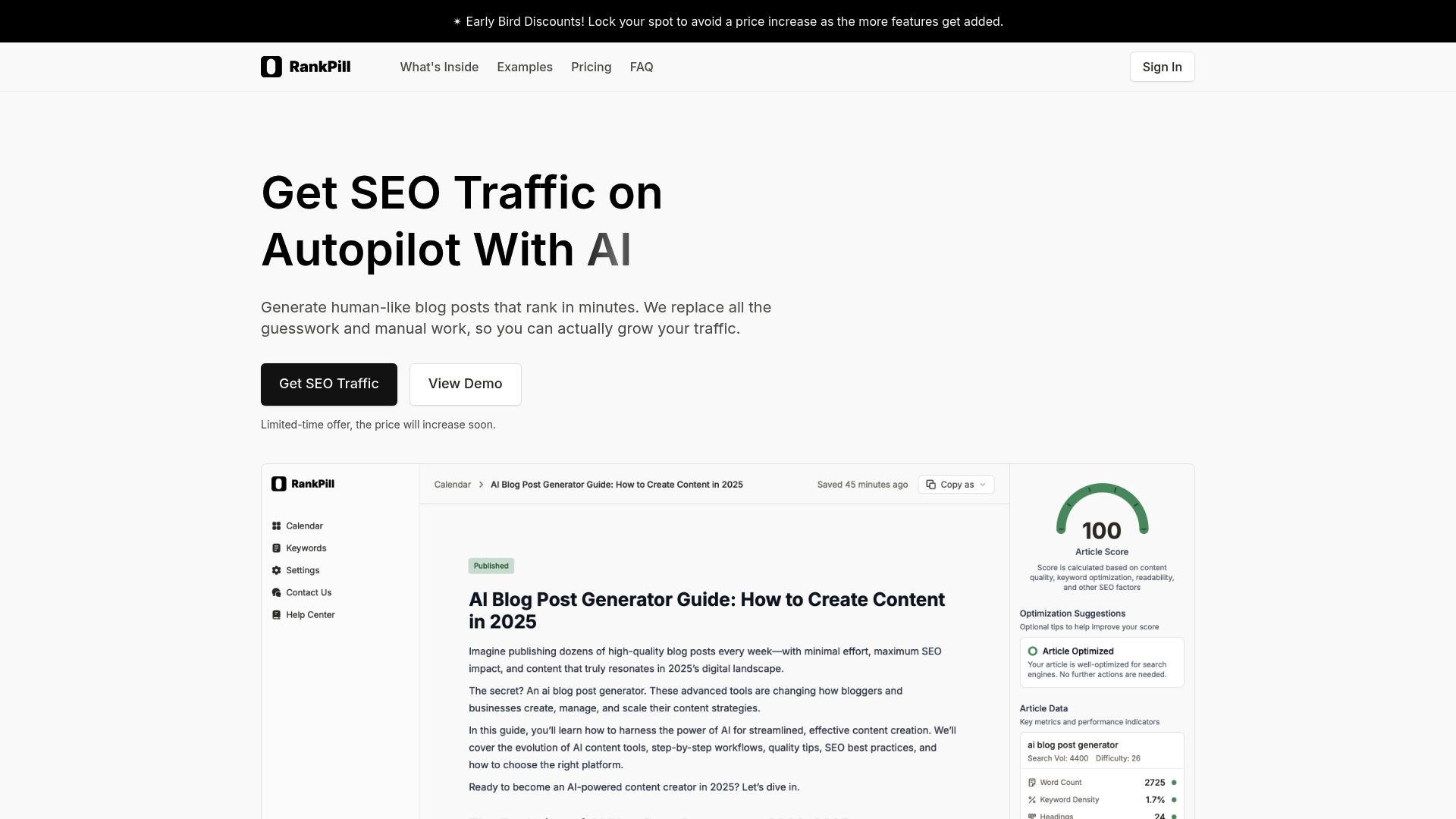Ever wonder how your competitors seem to always rank above you in search results? If you want to get keywords from website pages that are crushing it, you’re in the right place.
This complete guide will show you, step by step, how to uncover the exact terms driving their success—and how you can use them to power up your own SEO in 2025.
Inside, you’ll learn why keyword extraction is crucial, discover manual and automated methods, explore top tools, and see how to turn insights into real SEO wins. Ready to gain a true competitive edge? Let’s dive in.
Why Extracting Keywords from Websites Matters in 2025
The SEO world is evolving at breakneck speed. In 2025, search engines are smarter than ever—driven by AI, semantic understanding, and a relentless focus on user intent. If you want to stay ahead, you need to get keywords from website sources your competitors already dominate. Why? Because the rules of search have changed, and so must your approach.

Understanding the modern landscape means recognizing that keywords are no longer just isolated phrases. Today, they’re tightly connected to topics, context, and searcher needs. By making it a priority to get keywords from website competitors, you unlock the same language your audience is already using to find solutions.
The Competitive Edge
Imagine you’re driving blind on a racetrack, while your competitors have a detailed map. That’s exactly what happens if you don’t get keywords from website data. Knowing which terms fuel your rivals’ visibility gives you the power to reverse-engineer their success—then leapfrog past them.
A recent Semrush 2024: A Year in Review report highlights just how crucial this is: 70% of marketers say competitor keyword data directly shapes their SEO strategy. Businesses that consistently analyze and adapt their keyword lists routinely see more organic traffic, better click-through rates, and stronger rankings.
Fueling Content and Campaigns
Extracting keywords isn’t just about copying your competitors—it’s about spotting opportunities. When you get keywords from website analyses, you reveal content gaps, powerful PPC targets, and new angles for on-page optimization. For example, e-commerce brands often find high-converting, low-competition phrases buried deep in a competitor’s product descriptions or category pages.
Here’s a quick table summarizing the benefits:
| Benefit | How Keyword Extraction Helps |
|---|---|
| Content Creation | Inspires new blog topics & guides |
| PPC Campaigns | Uncovers profitable ad keywords |
| On-Page Optimization | Refines titles, meta, and headings |
| Gap Analysis | Reveals what you’re missing |
Continuous Improvement and Avoiding Pitfalls
Search algorithms don’t stand still. As Google and Bing roll out new updates, the keywords that mattered yesterday may not work tomorrow. That’s why ongoing analysis is vital—if you don’t regularly get keywords from website competitors, you risk falling behind or missing out on trending topics.
Ignoring this process can lead to stagnation. Many businesses that skip competitor keyword research struggle with declining traffic, missed ranking opportunities, and wasted ad spend. Staying proactive ensures you’re always aligned with both search engines and your audience’s evolving needs.
In short, learning how to get keywords from website competitors is your ticket to sustained growth in 2025. It’s not just a one-time task—it’s an ongoing strategy that brings clarity, focus, and a real edge in today’s crowded digital landscape.
Manual Methods: How to Get Keywords from Any Website by Hand
Looking to get keywords from website pages without fancy tools? Manual methods are still powerful in 2025, especially for hands-on SEOs and content creators. By rolling up your sleeves and digging into a competitor’s site, you can uncover valuable keyword gems others might overlook. Let’s break down five proven ways to get keywords from website content—no automation required.

Inspecting Page Source and Meta Tags
One classic way to get keywords from website pages is by checking the page source. Right-click anywhere on a competitor’s page and select “View Page Source.” Next, use Ctrl+F (or Cmd+F on Mac) to search for <meta> tags. Focus on the title, description, and any keywords meta tags you find.
These areas often reveal the primary keyword targets for that page. However, keep in mind that many modern sites skip the meta keywords tag, so don’t rely solely on it. Still, meta titles and descriptions nearly always offer insight into how brands try to get keywords from website content to rank well.
Analyzing Visible Content and Headings
Scanning a page’s headings—H1, H2, and H3 tags—can quickly help you get keywords from website articles. These headings typically showcase the core topics and keyword targets of the page. For example, a blog post about “best running shoes” might feature headings like “Top Running Shoes for 2025” or “Features to Consider.”
Look for keyword repetition and placement within these headings, as it often signals high-priority phrases. When optimizing your own content, remember to avoid pitfalls like keyword stuffing. For a deep dive, check out Avoiding keyword stuffing pitfalls to ensure a natural approach.
Reviewing Image Alt Text and URLs
Don’t overlook images and URLs when you want to get keywords from website pages. Well-optimized sites use descriptive image alt attributes, which often include target keywords. Hover over images or inspect the HTML to spot these alt texts.
Similarly, scan the site’s URLs and file names. Keyword-rich URLs, such as www.example.com/seo-tips/keyword-research, can reveal what phrases a competitor is targeting. E-commerce sites, for instance, frequently use product names and attributes in both alt text and URLs to get keywords from website listings ranked in search.
Examining Internal and External Links
Another manual method to get keywords from website pages is by analyzing anchor text—the clickable words in links. Internal links, which point to other pages within the same site, often use keyword-focused anchor text to signal important topics.
External links, especially those pointing to authoritative sources, can hint at the page’s topical relevance. For example, authority blogs often link to cornerstone content using descriptive anchor text. By reviewing both internal and outbound links, you can get keywords from website navigation paths or contextual link placements.
Using Google Search Operators
Google search operators are a secret weapon when you need to get keywords from website pages without special tools. Try commands like site:competitor.com to see all indexed pages or intitle:keyword to find pages with specific phrases in their titles.
Use these operators to uncover keyword-focused pages, landing pages, or even blog categories. For example:
site:example.com intitle:guide
This query helps you get keywords from website page titles and spot patterns in how competitors structure their content. While powerful, remember that search operators won’t reveal everything—combine them with the other manual methods above for a well-rounded strategy.
Automated Tools for Keyword Extraction in 2025
Automated tools have transformed how SEO professionals get keywords from website competitors, making the process faster, smarter, and more accurate than ever. In 2025, the landscape is shaped by AI, big data, and intuitive interfaces—giving you the edge to outpace rivals.
Instead of spending hours on manual research, you can now get keywords from website pages in seconds, using advanced features for sorting, filtering, and analysis. Whether you’re a solo blogger or an enterprise marketer, the right tool can be your secret weapon for SEO success.
Overview of Modern Keyword Extraction Tools
The fastest way to get keywords from website domains is through specialized SEO tools. Platforms like SEMrush, Ahrefs, and Moz offer robust keyword extraction engines that analyze millions of pages daily. These tools provide features such as real-time keyword rankings, competitive gap analysis, and SERP history.
Modern tools have evolved beyond simple lists—they now group and score keywords, track search intent, and suggest opportunities. For example, using AI-driven insights, you can instantly get keywords from website competitors and identify untapped phrases.
Here’s a quick comparison of leading tools:
| Tool | Strengths | Drawback |
|---|---|---|
| SEMrush | Deep competitor analysis | Premium pricing |
| Ahrefs | Backlink + keyword data | Learning curve |
| Moz | User-friendly interface | Smaller database |
Choosing the right tool depends on your budget, goals, and the depth of analysis you need.
Step-by-Step: Using SEMrush for Competitor Keyword Analysis
SEMrush is a favorite for marketers who want to get keywords from website rivals with surgical precision. Start by entering your competitor’s domain into the SEMrush Organic Research tool.
From there, you’ll see a dashboard showing top-performing keywords, estimated traffic, and rankings. Filter results by country, keyword type, or SERP features for a tailored view.
A practical tip: Export the keyword list for deeper analysis or use SEMrush’s built-in filters to focus on high-traffic, low-difficulty terms. This streamlined process ensures you never miss a valuable keyword opportunity.
Step-by-Step: Extracting Keywords with Ahrefs
Ahrefs’ Site Explorer is another powerful way to get keywords from website domains—especially for backlink-savvy users. Enter a domain, and the Organic Keywords section will reveal every keyword the site ranks for, along with traffic estimates and ranking positions.
Sort results by traffic, keyword difficulty, or search position to prioritize your efforts. For instance, comparing two competing domains side by side helps you spot keyword gaps and overlaps.
This workflow is ideal for agencies managing multiple clients or businesses targeting a specific industry niche.
Free Keyword Extraction Tools and Browser Extensions
If you’re on a budget, you can still get keywords from website pages using free tools like Ubersuggest and browser extensions such as Keyword Surfer. These options deliver quick insights without a steep learning curve.
- Ubersuggest: Enter a competitor’s domain for a snapshot of organic keywords and estimated traffic.
- Keyword Surfer: Instantly see keyword data as you browse search results.
- Keyword Sheeter: Bulk pulls keyword ideas from search suggestions.
While free tools are convenient, they often have limitations in data depth and freshness. For small businesses or quick audits, however, they’re a great starting point.
AI-Powered Solutions and Bulk Extraction
AI is rapidly changing the way you get keywords from website competitors. AI-powered tools automate grouping, clustering, and intent detection, making it possible to analyze thousands of keywords in minutes.
For large-scale projects, Natural Language Processing (NLP) can cluster keywords by topic, helping you build semantic-rich content. Some solutions even generate keyword suggestions based on the latest SERP trends.
To dive deeper into the capabilities of these advanced solutions, check out this AI-powered SEO tools overview—it offers a comprehensive look at how AI elevates keyword extraction in 2025.
Limitations and Data Accuracy Concerns
No tool is perfect. When you get keywords from website tools, remember that data accuracy can vary due to regional databases, update frequencies, and algorithm changes.
For example, keyword volumes might differ between tools, and newly ranking terms may not appear right away. Always cross-validate with multiple sources and, when possible, supplement automated findings with your own analytics.
A good practice is to set up regular reports and spot-check critical keywords to ensure your strategy stays on track.
RankPill: All-in-One AI Solution for Automated Keyword Extraction
RankPill is designed to help you get keywords from website competitors faster and smarter. Leveraging cutting-edge AI, RankPill delivers personalized keyword lists, competitor-driven strategy insights, and seamless integration into your content workflow.

Features include:
- Automated keyword extraction from any website
- AI-powered clustering and intent analysis
- Export-ready keyword lists for quick implementation
Businesses using RankPill report significant time savings and improved accuracy. By helping you get keywords from website targets at scale, RankPill empowers you to spot ranking opportunities and accelerate organic growth—no manual guesswork required.
Advanced Techniques: Going Beyond Basic Keyword Lists
Unlocking the full potential of SEO means moving past basic keyword dumps. To truly get keywords from website competitors and industry leaders, you need advanced strategies that reveal not just what terms they rank for—but how they structure, target, and evolve their keyword approaches. Below, let’s dive into the techniques that separate SEO pros from the pack.

Semantic Keyword Analysis and Topical Clustering
Modern search engines care deeply about context and user intent. To get keywords from website pages effectively, group them into semantic clusters—collections of closely related terms and topics. This approach helps you build pillar pages supported by targeted subtopics, signaling topical authority.
For example, if your core topic is “digital marketing,” clusters might include “content marketing,” “SEO tools,” and “email automation.” Tools like MarketMuse and Clearscope automate this clustering, but even a spreadsheet can work for manual grouping. For a deeper dive into how AI can enhance this process, check out Understanding AI and SEO integration.
Reverse Engineering Competitor Content Funnels
To get keywords from website competitors, map their content funnels from awareness to conversion. Start by listing their top pages, then analyze which keywords target informational searches (like “how to use X tool”) versus those aimed at buyers (“buy X software”).
Create a table to organize findings:
| Funnel Stage | Example Keyword | Target Page |
|---|---|---|
| Awareness | what is CRM | /blog/crm-guide |
| Consideration | CRM features | /crm/features |
| Conversion | buy CRM software | /pricing |
This mapping reveals high-converting keyword opportunities and helps you structure your own site for maximum impact.
Mining Keywords from User-Generated Content
User-generated content is a goldmine when you want to get keywords from website forums, Q&A, or product reviews. Real users naturally phrase problems and solutions, uncovering valuable long-tail keywords.
For instance, e-commerce brands can extract phrases like “best running shoes for flat feet” from customer reviews. Use simple tools or scripts to scan comments and highlight recurring questions or complaints. These organic phrases often have lower competition but high conversion potential.
Analyzing SERP Features and Intent Signals
To fully get keywords from website competitors, don’t just look at their pages—study the SERPs. Identify featured snippets, People Also Ask boxes, and related searches for your target queries.
Tools like Ahrefs or SEMrush can surface which keywords trigger these features. Document what types of content (guides, lists, videos) Google favors for each keyword. This analysis helps you optimize your own pages for higher visibility in rich SERP features.
Programmatic Keyword Extraction with Python/Automation
For large sites, programmatic extraction is essential if you want to get keywords from website domains at scale. Use Python libraries like BeautifulSoup and Requests to scrape meta tags, headings, and alt text. Combine with NLP libraries (like spaCy) to auto-extract and cluster keywords.
import requests
from bs4 import BeautifulSoup
url = "https://example.com"
html = requests.get(url).text
soup = BeautifulSoup(html, "html.parser")
keywords = [tag.text for tag in soup.find_all(['h1','h2','meta'])]
print(keywords)
For an academic perspective on algorithm effectiveness, review this User-Centred Evaluation of Keyword Extraction Algorithms study.
Combining Data from Multiple Sources
The most reliable way to get keywords from website analysis is to cross-reference results from several tools. Export keyword lists from SEMrush, Ahrefs, and manual extraction, then consolidate them in a spreadsheet.
Build columns for traffic, difficulty, and intent. This master list helps you spot overlaps, fill gaps, and prioritize efforts. Don’t forget to regularly update your data—search trends shift quickly.
Monitoring Keyword Shifts and Trends Over Time
SEO is never static. To continuously get keywords from website competitors and stay ahead, set up alerts for new rankings and shifting trends. Tools like Google Trends and SEMrush’s Position Tracking can notify you when a competitor starts ranking for a fresh keyword.
Monitor seasonal spikes and emerging topics. Regularly reviewing these shifts ensures your strategy adapts, capturing new opportunities before the competition.
Turning Extracted Keywords into SEO Wins
Turning the data you get when you get keywords from website research into real SEO results is where the magic happens. You’ve done the hard work—now it’s time to turn those keywords into traffic, rankings, and conversions.
Below, we’ll break down each step for transforming your extracted keyword lists into actionable SEO wins for 2025.
Keyword Mapping and Content Gap Analysis
Once you get keywords from website audits, the first step is keyword mapping. Assign each keyword to a relevant page or plan new content if gaps exist. This helps you cover every topic your competitors rank for, ensuring your site structure is both comprehensive and strategic.
Use a spreadsheet or dedicated tool to organize your findings. Filtering your keyword lists is essential for spotting overlaps, missing topics, and low-hanging fruit. For detailed instructions, see How to filter keyword lists.
With a clear map, you can build a content calendar, prioritize updates, and avoid duplicate targeting—maximizing every keyword’s potential.
Prioritizing Keywords by Search Intent and Value
To get keywords from website research working for you, focus on intent. Not all keywords are created equal—some drive buyers, others inform. Classify each by intent: commercial, informational, or navigational.
Next, evaluate value. Look at search volume, competitiveness, and potential ROI. Here’s a quick comparison:
| Intent | Example Keyword | Value |
|---|---|---|
| Commercial | buy running shoes | High ROI |
| Informational | how to lace shoes | Traffic driver |
| Navigational | Nike homepage | Brand traffic |
Pick high-value, low-competition keywords for quick wins. Always align intent with your business goals for the best results.
Creating Optimized Content Based on Extracted Keywords
Now, it’s time to use the insights you get when you get keywords from website analysis to craft content that ranks. Start by creating outlines or briefs that include your target keywords, related terms, and user questions.
Aim for natural keyword integration—avoid forcing phrases or stuffing. Use each keyword in titles, headings, and early in your content. A sample blog post outline might look like:
- H1: Target keyword
- H2: Supporting question
- Bullet points: Related keywords
This ensures your content is both relevant to search engines and genuinely helpful to readers.
On-Page SEO and Internal Linking Strategies
To fully capitalize on the keywords you get from website research, optimize every page element. Place primary keywords in titles, meta descriptions, and H1/H2 tags. Sprinkle secondary keywords throughout your headings and body text.
Internal linking is just as important. Link related articles and cornerstone content using keyword-rich anchor text. This builds a silo structure, strengthening your site’s topical authority.
A well-linked, well-optimized site makes it easier for both users and search engines to navigate—and increases your chances of ranking.
Tracking Performance and Refining Keyword Strategy
After you get keywords from website sources and implement them, monitor your results closely. Use tools like Google Analytics and Search Console to track keyword-driven growth, traffic, and rankings.
Set up monthly dashboards to review progress. Compare your performance to industry benchmarks—according to 96 Content Marketing Statistics for 2025, businesses that update and refine keyword strategies see up to 2x more organic traffic.
Regularly revisit your keyword lists, spot new opportunities, and adjust targeting as needed for ongoing SEO success.
Common Mistakes and How to Avoid Them
Even if you get keywords from website competitors, mistakes can sabotage success. Watch out for these pitfalls:
- Over-relying on tools without manual review
- Ignoring search intent or changing trends
- Keyword cannibalization (multiple pages targeting the same keyword)
- Neglecting to update keyword lists as the market shifts
Fix these by combining automation with hands-on checks, staying up-to-date with trends, and consolidating or reassigning overlapping pages. This keeps your SEO strategy sharp and effective.
Now that you know exactly how to uncover and use keywords from any website—from manual hacks to advanced AI-powered tools—it’s time to put these strategies into action. Imagine how much easier your SEO journey could be if you had a platform that automates keyword research, competitor analysis, and even content creation, all while keeping your workflow simple and efficient. If you’re ready to boost your organic traffic and finally outpace your competition, let’s take the next step together.
Get Started